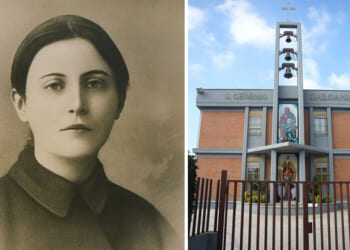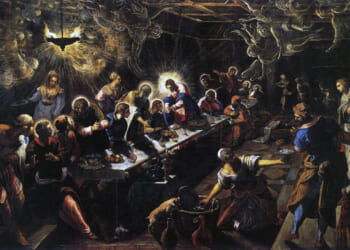The new name, “Stalingrad International,” commemorates Soviet WWII victory, reflecting growing Soviet nostalgia and authoritarian symbolism as part of broader efforts to justify Putin’s war in Ukraine.
Russian President Vladimir Putin hasn’t tried to hide his admiration for the Soviet Union, while he has often praised the Soviet Red Army’s role in defeating Nazi Germany. In February 2023, Putin marked the eightieth anniversary of the Soviet victory in the Battle of Stalingrad by laying a wreath at the eternal flame that serves as a memorial to the Red Army soldiers who fought in the battle.
He further used that event to justify Russia’s “special military operation” in Ukraine, offering the false suggestion that Kyiv was an illegitimate neo-Nazi regime.
Now, just days before the eightieth anniversary of the end of the Second World War, still known in Russia as “The Great Patriotic War,” Putin went even further following a visit to the Heroes of the Battle of Stalingrad memorial complex on Mamayev Kurgan with President of Belarus Alexander Lukashenko, signing a decree that renamed Volograd’s airport to Stalingrad International Airport.
The city had been founded on the Volga River as Tsaritsyn in the 16th century, and was the site of a significant battle during the Russian Civil War, changing hands multiple times. In 1925, it was renamed Stalingrad in honor of Soviet dictator Joseph Stalin, and less than two decades later, it was the site of one of the most significant battles of the Second World War.
The German 6th Army was encircled and destroyed in early 1943, an event that was a turning point in the war.
It was renamed Volograd in 1951 as part of the Soviet Union’s de-Stalinization campaigns.
Volograd Airport Wasn’t the Only Soviet-Era Name Change
Though the city will remain Volograd, the change to Stalingrad International Airport is meant to honor World War II veterans. This move is strongly supported by members of the modern Russian Communist Party, which has also called for the city to be renamed.
Last month, Rosaviatsia, the Russian civil aviation agency, announced that from May 8 to May 10, to mark the 80th anniversary of the end of the Great Patriotic War, air traffic controllers would use the historic names for the airports in Volograd and St. Petersburg. The latter would be called “Leningrad,” which the city was known as from 1924 until 1991.
“Temporarily returning historical names to the airwaves of our hero cities is the least we can do to honor the courage and resilience of their defenders and residents,” Rosaviatsia said in a statement, The Moscow Times reported.
Why Did Putin Change the Name of Volograd Airport?
Though it is just the airport, there is growing speculation that Putin could restore Volograd’s Soviet-era name to Stalingrad, and several factors are at play.
“Putin has been increasingly embracing Stalin and Stalinism for several years,” explained Dr. Paul D’Anieri, professor of political science and public policy at the University of California, Riverside.
“This serves several connected goals, including connecting the current war on Ukraine to the victory over Germany in World War II, justifying dictatorship, and linking himself to the great dictators and autocrats of Russia’s past,” D’Anieri told The National Interest via email.
“The fact that Putin renamed the Volgograd airport Stalingrad is highly symbolic,” added Dr. David L. Hoffmann, College of Arts and Sciences distinguished professor of history at the Ohio State University.
Hoffmann also emailed The National Interest to say this will be the latest name change for the industrial city in southern Russia.
“Nikita Khrushchev changed the city’s name to Volgograd in 1961 as part of his de-Stalinization campaign, an effort to repudiate Stalin’s bloody dictatorship,” Hoffman suggested.
“Putin has left the question of whether the city should once again be called Stalingrad, but his renaming the airport is a step in that direction. Not only does the renaming invoke the Soviet victory at the Battle of Stalingrad, but it also implies an acceptance of authoritarian rule for the sake of national strength.”
That symbolism from the past can already be seen at the annual Victory Day Parade in Moscow, where in recent years a sole T-34 medium tank has been the only armor the Russian Army can spare; but also in the annual Navy Day Parade in July that is likely meant to tie Putin to Tsar Peter I of Russia, founder of the Russian Navy.
That latter fact could explain why Volograd could eventually become Stalingrad again, while St. Petersburg will likely keep its current name.
About the Author: Peter Suciu
Peter Suciu has contributed over 3,200 published pieces to more than four dozen magazines and websites over a thirty-year career in journalism. He regularly writes about military hardware, firearms history, cybersecurity, politics, and international affairs. Peter is also a Contributing Writer for Forbes and Clearance Jobs. He is based in Michigan. You can follow him on Twitter: @PeterSuciu. You can email the author: [email protected].
Image Credit: Shutterstock/ miss.cabul.















